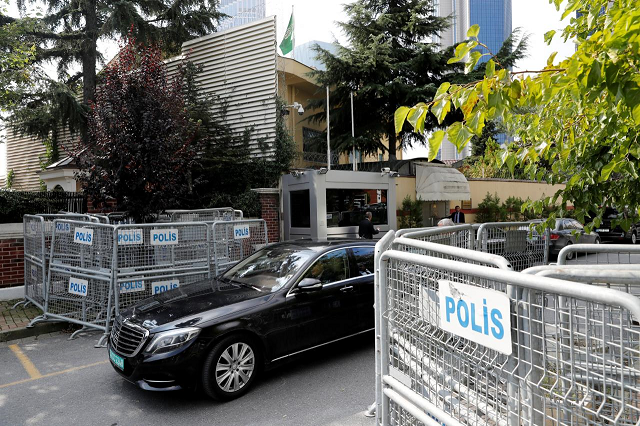Prominent Saudi commentator disappears after entering Istanbul consulate: friends
Upon contact the consulate says it does not provide information to the media

A car leaves the Saudi Arabia's consulate in Istanbul, Turkey, October 3, 2018. PHOTO: REUTERS
Khashoggi’s Turkish fiancée as well as a close friend contacted by Reuters said he had not been seen after entering the diplomatic mission on Tuesday to secure documentation of his divorce so that he could remarry.
The fiancée, who asked not to be named, said she had waited outside the consulate from 1 pm local time (1000 GMT) and called the police when he had not reappeared.
“Where is Jamal? That’s the question we want answered: where is Jamal?” she said on Wednesday outside the consulate, where she had waited for 12 hours the day before.
Saudi economist who criticised oil firm IPO charged with terrorism: report
Contacted by Reuters for comment, the consulate said it did not provide information to the media. A spokesperson for Istanbul police said they do not have any information regarding the issue. The Saudi Embassy in Washington did not immediately respond to a request for comment on Tuesday.
The continued absence of the prominent former newspaper editor, for years a familiar face on political talk shows on Arab satellite television networks, could complicate already uneasy ties between Riyadh and Ankara.
Turkey has had strained relations with Saudi Arabia and other Gulf Arab states since June 2017, when Ankara stood by Qatar in a regional row. Arab states cut trade and diplomatic ties with Qatar over alleged links to terrorism, which Doha denies.
Turkey has also worked with Iran, Saudi Arabia’s arch-rival in the Middle East, to try to reduce fighting in northern Syria, and Iranian and Turkish military chiefs exchanged visits last year.
When asked whether the US State Department has sought information from the Saudis and the Turks, an official in Washington said on Tuesday, “We have seen these reports and are seeking more information at this time.”
INSIDER ON THE OUTS
Khashoggi is a former Saudi newspaper editor who has lived in self-exile in Washington, DC for more than a year after he said the authorities had instructed him to stop tweeting.
As a journalist, he interviewed Al Qaeda leader Osama bin Laden several times in Afghanistan and Sudan, and served twice as editor of Al Watan newspaper.
He advised Prince Turki al-Faisal, former Saudi intelligence chief and ambassador to the United States and Britain, and has also been close to billionaire investor Prince Alwaleed bin Talal.
Over the past year, Khashoggi has written regular columns in the Washington Post criticizing Saudi Arabia’s policies toward Qatar and Canada, the war in Yemen, and a crackdown on dissent and the media and activists which has seen dozens of activists, intellectuals and clerics detained.
“I have left my home, my family and my job, and I am raising my voice,” he wrote in September 2017. “To do otherwise would betray those who languish in prison. I can speak when so many cannot.”
Ali Shihabi, head of the Arabia Foundation in Washington which regularly supports Saudi policy, expressed concern on Twitter about the reports.
“Jamal and I have not seen eye to eye on many issues but having him go missing like this is awful,” he said.
Saudis link investment with China tie-up
Mohamad Soltan, an Egyptian-American activist who sees Khashoggi regularly in Washington, told Reuters that Khashoggi was in the United States on an O-visa, a temporary residency visa awarded to foreigners “who possess extraordinary ability” in the sciences, arts, education, and other fields and are recognized internationally, and had applied for permanent residency status.
All public protests are banned in Saudi Arabia, as are political parties. Labor unions are illegal, the media are controlled and criticism of the royal family can lead to prison.
Dozens of activists, clerics and intellectuals have been arrested in the past year in a crackdown on potential opponents of the kingdom’s absolute rulers. Among them was economist Essam al-Zamil, a friend of Khashoggi’s, who was charged this week with joining a terrorist organization, meeting with foreign diplomats and inciting protests.
Scores of businessmen were detained last November in Riyadh’s Ritz-Carlton hotel in a separate campaign against corruption, unnerving some foreign investors. Most were released after reaching financial settlements with the authorities.



















COMMENTS
Comments are moderated and generally will be posted if they are on-topic and not abusive.
For more information, please see our Comments FAQ